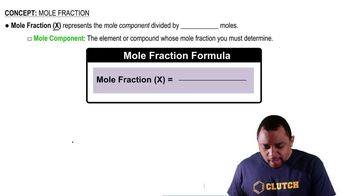Here are the essential concepts you must grasp in order to answer the question correctly.
Partial Pressure
Partial pressure refers to the pressure exerted by a single component of a gas mixture. According to Dalton's Law of Partial Pressures, the total pressure of a gas mixture is the sum of the partial pressures of each individual gas. In this context, understanding how to calculate the partial pressure of oxygen based on its mole fraction is essential for determining the appropriate composition of the diving gas.
Recommended video:
Partial Pressure Calculation
Mole Fraction
Mole fraction is a way of expressing the concentration of a component in a mixture, defined as the ratio of the number of moles of that component to the total number of moles of all components in the mixture. In this question, the mole fraction of oxygen is given as 0.21, indicating that 21% of the gas mixture should be oxygen. This concept is crucial for calculating the partial pressure of oxygen in the diving gas.
Recommended video:
Gas Laws
Gas laws describe the behavior of gases under various conditions of pressure, volume, and temperature. The ideal gas law (PV=nRT) is particularly relevant here, as it relates the pressure of a gas to its volume and temperature. Understanding these laws helps in calculating how the pressure at a certain depth affects the partial pressures of gases in a diving scenario.
Recommended video:




